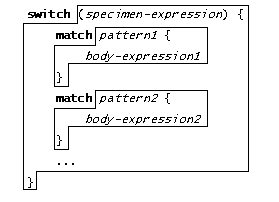| |
The switch Expression |
||||||

This is much like the familiar switch, except the case-clauses have been replaced with match-clauses, and there's no longer a need for that irritating break to prevent fall-through. (There is also no longer the ability to fall through, but this seems like a good trade.) The specimen-expression is evaluated once, and the resulting value is matched against each pattern from top to bottom until a match is found. On the first match, the corresponding body-expression is evaluated, and its outcome is the outcome of the switch. If no patterns match, a to-be-specified*** exception is thrown.
To say the equivalent of "case constant" use "match ==constant", since the "==" pattern only matches if the specimen is the same as the expression on the right. To say the equivalent of "default", use "match _ " as the last matcher, since it will match everything not previously matched.
*** forget the expansion, or rather, postpone to appendix
Switch is precicely defined by this expansion to Kernel E:
{
def temp := specimen-expression
if (temp =~ pattern1) {
body-expression1
} else if (temp =~ pattern2) {
body-expression2
} ... {
...
} else {
throw(...) #Exception to be specified
}
but implementations are encouraged to optimize those uses equivalent to "case constant" and "default".
Unless stated otherwise, all text on this page which is either unattributed or by Mark S. Miller is hereby placed in the public domain.
| |
|
report bug (including invalid html) |
||||||||